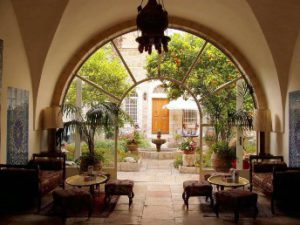After suffering a series of tragic losses, Chicago natives Anna and Horatio Spafford led a small American contingent in 1881 to Jerusalem to form a Christian utopian society. The „American Colony,” as it became known, was later joined by Swedish Christians. The society engaged in philanthropic work amongst the people of Jerusalem regardless of religious affiliation, gaining the trust of the local Muslim, Jewish, and Christian communities. During and immediately after World War I, the American Colony carried out philanthropic work to alleviate the suffering of the local inhabitants, opening soup kitchens, hospitals, orphanages and other charitable ventures. In addition, members of the Colony were permitted to photograph behind Turkish lines to create a truly unique record of life under the constraints of war.[citation needed]
Although the American Colony ceased to exist as a religious community in the late 1940s, individual members continued to be active in the daily life of Jerusalem. Towards the end of the 1950s, the society’s communal residence was converted into the American Colony Hotel. The hotel is an integral part of the Jerusalem landscape where members of all communities in Jerusalem still meet. In 1992 representatives from the Palestine Liberation Organization and Israel met in the hotel where they began talks that led to the historic 1993
When the Ottoman Empire entered World War I as an ally of Germany in November 1914, Jerusalem and Palestine became a battleground between the Allied and the Central powers. The Allied forces from Egypt, under the leadership of the British, engaged the German, Austrian and Turkish forces in fierce battles for control of Palestine. During this time the American Colony assumed a more crucial role in supporting the local populace through the deprivations and hardships of the war. Because the Turkish military commanders governing Jerusalem trusted the Colony, they asked its photographers to record the course of the war in Palestine.
The Colony was permitted to continue its relief efforts even after the United States entered the war on the side of the Allies in the spring of 1917. As the German and Turkish armies retreated before the advancing Allied forces, the American Colony took charge of the overcrowded Turkish military hospitals, which were inundated by the wounded.
The outbreak of World War I in 1914 brought great suffering to the country. All young men were conscripted into the army, while the older men were drafted into work brigades. Food supplies dwindled as the Allies sustained a blockade of the Palestinian coast, and the Turkish army confiscated provisions. Weakened by malnutrition, people died of typhus and other epidemics. As famine, disease, and death ravaged the people of Jerusalem, the Colony, struggling for their own survival, engaged in relief work. With money from friends in the United States, the American Colony ran a soup kitchen that fed thousands during these desperate times. When the British Allied commander, General Allenby, entered Jerusalem on December 11, 1917, the Colony offered their philanthropic services to the new rulers of Palestine and continued to serve their fellow Jerusalemites
 Today the American Colony Hotel calls itself an oasis of neutrality in the Palestinian-Israeli conflict. It is still owned by descendants of the Spaffords. A grandson, Horatio Vester, was the manager until he retired in 1980. His wife, Valentine, lived in the hotel until her death in June 2008. Since 1980, the hotel has been run by a Swiss company. The effendi’s original bedroom is called „Room One.” In 1995, Peter Ustinov visited the hotel and planted a palm tree in the courtyard.
Today the American Colony Hotel calls itself an oasis of neutrality in the Palestinian-Israeli conflict. It is still owned by descendants of the Spaffords. A grandson, Horatio Vester, was the manager until he retired in 1980. His wife, Valentine, lived in the hotel until her death in June 2008. Since 1980, the hotel has been run by a Swiss company. The effendi’s original bedroom is called „Room One.” In 1995, Peter Ustinov visited the hotel and planted a palm tree in the courtyard.
History
The building was originally owned by Rabbah Daoud Amin Effendi al-Husseini, who lived there with his harem of four wives. Soon after his fourth marriage, al-Husseini died. In 1895, the building was sold to a group of messianic Christians who arrived in Jerusalem in 1881 and set up a commune. Their leader was Horatio Spafford, a lawyer from Chicago and his wife, Anna. In 1896, the Americans were joined by two groups of Swedish settlers. This Christian utopian society became known as the American Colony.
Historic photo in the hotel gardensIn 1902, a Jaffa hotelier named Ustinov (grandfather of the British actor Peter Ustinov) was looking for a place to put up guests visiting Jerusalem and asked the Spaffords to accommodate them. Soon after, the building was turned into a hotel.

